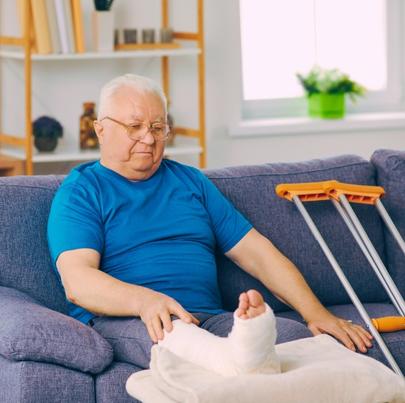Nursing home negligence can be reported through national and state organizations, local law enforcement, regional help hotlines, a long-term care ombudsman, and medical professionals.

Nursing Home Neglect and Abuse
In the United States, approximately two million adults reside in nursing homes and long-term care facilities. Due to existing health conditions and compromised immune systems, many face high risks for a variety of health-related problems, including nursing home neglect and abuse. While many cases are reported to proper authorities, thousands of cases go unnoticed and undetected, so residents suffer in silence without help.
According to the National Center on Elder Abuse (NCEA), nursing home neglect and abuse is a growing concern since millions of baby boomers are now over 65 years old. NCEA statistics on elder abuse show that one in six elderly adults in nursing homes suffer some type of physical or emotional neglect or abuse by their caregivers. Nursing home neglect lawyers often witness cases of physical injuries, verbal abuse, and neglect of basic needs like food and water, medications, and sanitary conditions.
When nursing home residents are neglected, they often suffer physical and emotional health problems, including:
- Fractures and broken bones from falls
- Bruises and abrasions from bed restraints
- Bedsores and skin infections
- Malnutrition, dehydration, and eating disorders
- Anxiety and depression
- Insomnia
NCEA studies show that elderly victims of nursing home neglect and abuse are twice as likely to die prematurely, and even minor injures can lead to permanent health problems or death. Major risk factors include residents with dementia and Alzheimer’s, physical disabilities, social isolation, and limited visitors.
Beware: Facility Violations and Penalties
Mortality rates are especially high in private equity-owned nursing homes that operate for profit. Unlike state and federally-regulated facilities that are funded by Medicare and Medicaid, privately-owned facilities are funded by profits which are frequently increased by cutting budgets for nurses, caregivers, and safety equipment.
To alert people to nursing homes and long-term care facilities with a history of substandard care, the Centers for Medicare and Medicaid Services (CMS) introduced 3 online icons that alert consumers to facilities that have been cited for safety violations. CMS alert icons allow the public to compare nursing home operations, check for violations, and review legal actions filed by nursing home neglect lawyers.
- Red Icon – Indicates citations within the past year for physical, emotional, verbal, and sexual forms of neglect or abuse that caused harm to a resident. It’s a red flag to consumers, since some of the worst health conditions seen by nursing home neglect lawyers are indicated.
- Yellow Icon – Indicates a Special Focus Facility (SFF) that’s participating in a program due to repeated violations. SFF facilities are subject to full onsite inspections every six months and subject to permanent closure for lack of compliance.
- Green Icon – Indicates no violations/citations within the last two years. Due to strict CMS Medicare and Medicaid funding regulations, facilities that don’t comply are subject to large monetary fines, safety violations, loss of federal funding, and permanent closure.
Reporting Nursing Home Negligence
NCEA defines nursing home neglect as a type of elder abuse caused by a lack of proper care and attention. It is commonly caused by nurses, caregivers, and aides who provide substandard care or fail to provide necessary caregiver duties to keep elderly patients safe from harm.
According to the U. S. Department of Justice, caregiver neglect is the main cause of injury for elderly adults in nursing homes, long-term care facilities, and private in-home care. For every case that gets reported, 57 cases go unreported. To prevent harm, family members and friends with loved ones in nursing homes should watch for signs of neglect and abuse and report them to the proper authorities:
National Center on Elder Abuse
The National Center on Elder Abuse (NCEA) is a national resource center dedicated to the prevention of elder neglect and abuse. As part of the U.S. Department of Health and Human Services, NCEA does not investigate complaints but works with various resources that provide help.
Adult Protective Services
Adult Protective Services (APS) has offices in every state. As a social services program provided by state and local governments, APS workers investigate complaints of elder neglect, abuse, and exploitation while working closely with medical professionals and police officers.
Local Law Enforcement
When nursing home neglect presents dangers or causes harm, local law enforcement should be notified right away. They can remove a resident from a facility or a dangerous situation. If laws are broken by the nursing home or staff, police will conduct a criminal investigation.
A Long-Term Care Ombudsman
A local ombudsman serves as an advocate for adults in nursing homes and long-term care facilities. He or she will address the concerns of loved ones, investigate facilities for signs of neglect and abuse, and help victims take legal action through a nursing home neglect lawyer.







